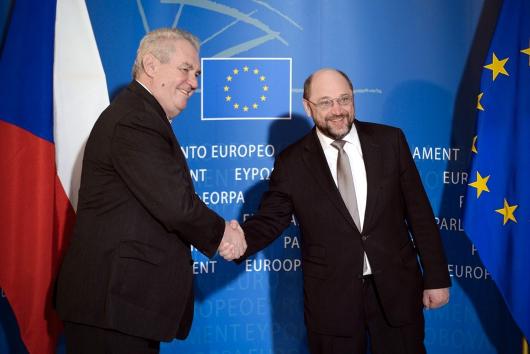
Czech President in European Parliament
27.02.2014 / 19:15 | Aktualizováno: 28.02.2014 / 19:54
The President of the Czech Republic Miloš Zeman paid an official visit to the European Parliament in Strasbourg on February 26. 2014. In his formal address to Parliament president Zeman said "We need a European federation, not a European unitary state".
The text of President’s address:
Mr President, every politician who speaks in the European Parliament expresses, tacitly or openly, his European dream, so let me follow that good tradition. First however, I want to tell you what my European dream is not. I am inspired here by a well-known Polish philosopher, Leszek Kolakowski, who gave a lecture, I guess in 1957, under the title ‘What is Socialism?’ and started by saying, ‘Comrades, I was asked to tell what socialism is. Very well, but first I will tell you what socialism is not. Socialism, comrades, is not the murder of political opponents, socialism is not concentration camps, socialism is not political prisoners, socialism is not censorship ...’ and he continued in that vein for more than half an hour.
I can tell you in just five minutes what my European dream is not. I should add first though that, at the end of his lecture, Kolakowski said, ‘Now, comrades, I will tell you what socialism is: socialism, comrades, is a good thing.’ And that was all.
So now, in five minutes, I will tell you what my European dream is not. My European dream does not include the crazy movement of the European Parliament from Strasbourg to Brussels and back.
(Applause)
My European dream does not include a nonsensical directive about, for example, economy safety light bulbs. I have one of these in my cottage and it makes it look like a cemetery or a mortuary, so I speak from experience. My European dream does not include the so-called European architecture of Brussels, some of which looks like an oversize wood box. Nor does my European dream include the steak I encountered recently at the European Commission, which looked and tasted like bubblegum – to take another example from my own experience.
Now I shall tell you what my European dream is, and I shall start by quoting another philosopher – Czech this time – Václav Bělohradský, who said that European citizenship was a ‘cultural choice’. I agree with him. We were all born somewhere, and that is not to our credit, but the cultural choice for European citizenship is a choice made of our own free will and is valid and useful, particularly in a complicated situation such as we have today. Let us define what it means. Culture, firstly, is more than cold economic calculation, comparing losses and benefits. Culture is a set of common rules
of behaviour, and what we need in an integration process is to start with common rules – or equal rules, if you wish, which are not the same as equal levels. What is the difference? The common rule is, for instance, the relationship between the minimum wage and the average wage, but the levels of those wages depend on labour productivity. Levels cannot be regulated by common principles. However, we need common rules in many areas of European policy.
Let us start with foreign policy. Henry Kissinger’s ironic question ‘Who do I call if I want to speak to Europe?’ is still valid. There is still no common foreign policy in the European Union. As for so-called soft policy, I must say critically that it sometimes feels like a repetition of the appeasement of the 1930s. But in order to have something more than soft policy, we need a common defence policy. We have 28 armies which are not fully compatible, whereas a common European army – and this is a long-term dream – would be cheaper and more effective.
We need a common fiscal policy and the harmonisation of taxation. I am very happy to tell you that the Czech Republic has adopted the Fiscal Pact, and I am a strong supporter of a move towards the euro as soon as possible.
Those who criticise the euro suffer from what I would call a fear of the unknown. I think the euro has been a stabilising factor for economic development.
More than that, however, we need common rules in the field of social policy, starting with the European Social Charter. We need common rules on environmental policy and, at the end of the day, we need the courage for big projects like the trans-European networks, including railways, highways, water corridors and so on, even if such long-term projects lie beyond the horizon of political thinking, which is usually only four years ahead.
Let me conclude with a protest. I wonder whether Mr Cohn-Bendit is here. Unfortunately not, it seems. He issued the declaration: ‘Young Europeans, unite!’ and I want to protest at that because I am an old European and I understand his declaration as a form of age discrimination, which is strictly against the principles of the European Union. More than that, what does ‘unite’ mean? If it means ‘integrate with common rules’, I fully agree. If it means ‘unify’, I am strictly against it because to be uniform is to be grey and boring. I am against common European cheese and common European beer – I might recommend Czech beer, which is the best in the world – but what
we need is integration and a European federation, not a European unitary state.
Finally, allow me to paraphrase Leszek Kolakowski: ‘Deep in my heart, I do believe that the European Union is a good thing.’ Thank you very much for your attention.
(Loud applause)




